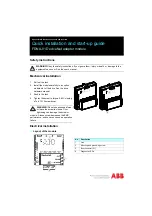
Enrange Flex EM/EX Instruction Manual
April 2019
Page 14 of 19
5. Now press any push button on the transmitter handset to operate the equipment. When a button
is pressed, the Status LED will flash orange with a variable speed dependent on how far the
button is pressed. The further a button is pressed, the faster the LED will flash. When no
buttons are pressed, the Status LED will slowly blink green.
6. In case of an emergency, pressing down on the red emergency stop button will immediately
disconnect the receiver E-Stop and turn off the unit. To reset the emergency stop button just
rotate the red button either clockwise or counter-clockwise and then cycle power to the unit.
7. After a period of inactivity (push button not pressed) defined by the dip-switch, the receiver E-
Stop will be disconnected and the unit must cycle power before turning on again.
8. Turn off the transmitter power by rotating the power key counter-
clockwise to the “Off” position
(the Status LED becomes a solid red for 4 seconds). This will disconnect the transmitter
power and the receiver E-Stop altogether. Turn it further counter-clockwise to release the
key.
5.2 CHANGING TRANSMITTER BATTERIES
Change the transmitter batteries by unscrewing the battery cover located on the backside of the
transmitter (refer to Figure 11 and Figure 12 below). During battery installation make sure that the ribbon
is centered between the two batteries. After changing the batteries also make sure that all screws are
tightened to avoid water, moisture, dirt, grease, or other liquid penetration.
Figure 11
1
2
↓
Figure 12




































